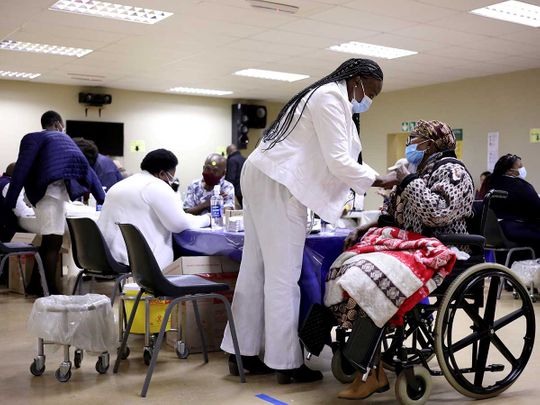
While the attention in much of the developed world is turning to post-pandemic issues of easing restrictions, vacations and a return to normal, Africa is in the grip of a crippling third wave of infections and bracing for a fourth - and maybe even a fifth.
As the more contagious delta variant starts to spread across the least-vaccinated continent, cases are rising, hospitals are being overrun and deaths are mounting. With little prospect of a significant proportion of Africans being vaccinated in coming months as rich nations continue to hoard shots, epidemiologists expect another wave of disease will follow before the end of the year. That carries the risk of more vaccine-resistant variants developing, endangering not just Africans but also the rest of the world.
“This third wave is going to be devastating because in Africa and South Africa we couldn’t get access to vaccines when we needed them most,” said Tulio de Oliveira, director of Krisp, a South African genetic-sequencing institute. “If we don’t get vaccines in the next couple of months we risk another devastating wave, not only in numbers but in lives.”
Africa remains woefully under-vaccinated, with only 1.1% of the continent’s 1.2 billion people having gotten a jab compared with about 50% of the populations of the US and the UK that are fully inoculated. Only 50 million of the more than 3 billion doses of vaccines that have been administered globally have been in Africa, according to the Africa Centres for Disease Control and Prevention, and the effects of that are becoming apparent.
Cases are doubling every three weeks, and the continent is on the verge of exceeding its worst week of the pandemic. On Friday, the number of South African daily coronavirus infections surged to a record. Cities from Johannesburg to Kampala have been forced to lock down and intensive care units are overflowing. In the continent’s poorer countries, patients are dying because of a lack of oxygen and health-care workers are overwhelmed, with nurses looking after as many as 40 patients each.
Unprecedented scale
In Gauteng, South Africa’s economic hub and the richest area on the continent, excess deaths rose to a pandemic-era record in the week to June 20 and private hospitals are airlifting patients to other provinces. With 4,795 cases per million people, Namibia had the worst epidemic globally over the last seven days. Meanwhile, medical facilities and mortuaries in many countries are struggling to cope.
Coffin makers and florists in Lusaka, Zambia’s capital, say they are struggling to keep pace with demand. Laura Miti, a social activist in the country, said a colleague died of COVID-19 after spending time in a hospital, where patients perished as power outages interrupted oxygen supply. The shortage of front-line workers is also taking a toll, she said.
“The nurses are overwhelmed, frustrated,” Miti said. “There’s just not enough of them.”
According to the Africa CDC, the continent has had just under 5.4 million confirmed COVID-19 infections and about 141,000 deaths since the pandemic began. But the numbers are seen to be grossly under-reported, with excess deaths in South Africa alone standing at 176,000.
“The speed and scale of Africa’s third wave is like nothing we’ve seen before,” said Matshidiso Moeti, Africa director for the World Health Organization, on a conference call on Thursday.
The latest wave has taken the pandemic to a whole new level, and with poor access to vaccines there’s little hope that the same situation won’t play out again.
Soccer vs curfews
Rich nations are sitting on shots, having purchased way more than they need, and Covax, the WHO-backed vaccine-sharing initiative, has shipped just 91 million doses out of its target of sending 1.8 billion doses to 90 poor nations by early 2022. India, where much of Covax’s supply was coming from, halted exports to deal with its own devastating outbreak.
Africa is not looking for charity, Richard Mihigo, programme area manager for immunisation and vaccine development at the WHO’s Africa office, said in an interview. “It is to give the chance to the international community not to see a more transmissible variant emerge that would put all the efforts of even high-income countries to zero.”
Stung by criticism, wealthy countries including the US and UK have pledged to donate millions of doses. Shipments of Pfizer Inc. and Johnson & Johnson vaccines donated by the US are set to arrive next week, said Strive Masiyiwa, the telecommunications billionaire tasked with helping the African Union secure shots.
Meanwhile, as the Delta variant rapidly spreads around the globe, the fates of vaccinated and unvaccinated nations are beginning to diverge. On July 1, the UK recorded almost 28,000 cases but just 22 deaths. In contrast, South Africa reported 21,500 cases and 382 deaths.
In Europe a continent-wide soccer tournament is taking place complete with spectators cheering on national teams in stadiums. In South Africa a curfew means people have to be home by 9pm, and in Uganda parliament has been closed to slow the spread of the virus.
“If we do not vaccinate at speed, our economy will continue to be damaged,” John Nkengasong, director of the Africa CDC, said on Thursday. “You will see a fourth, fifth and sixth wave and it will be extremely difficult for us to survive as a people. Let us be very clear that is what is at stake.”








